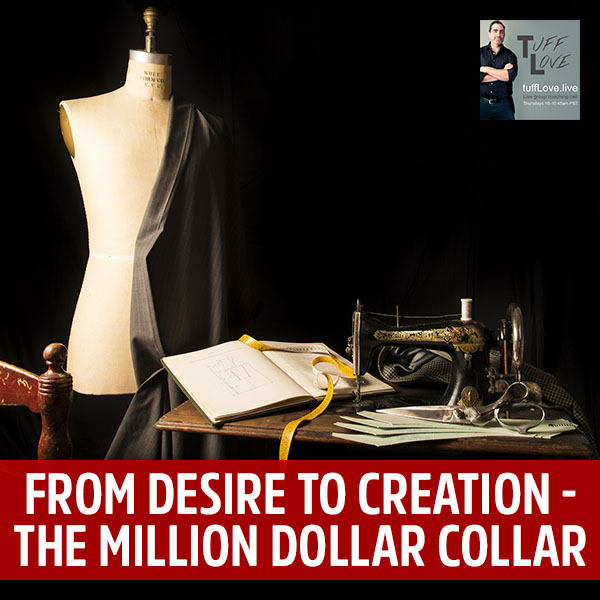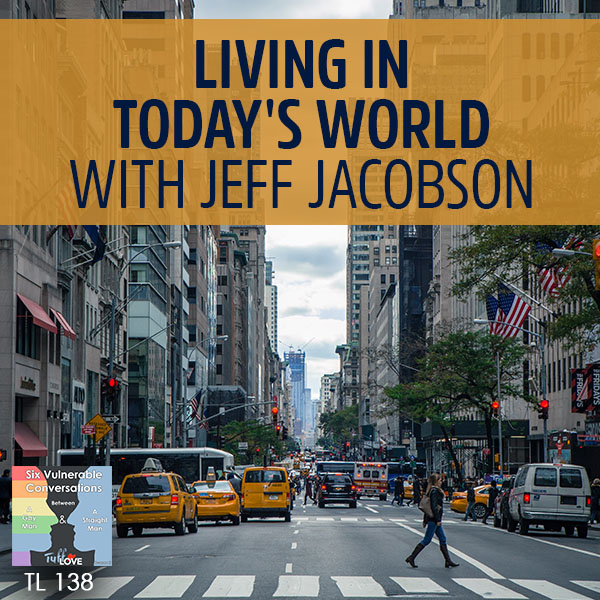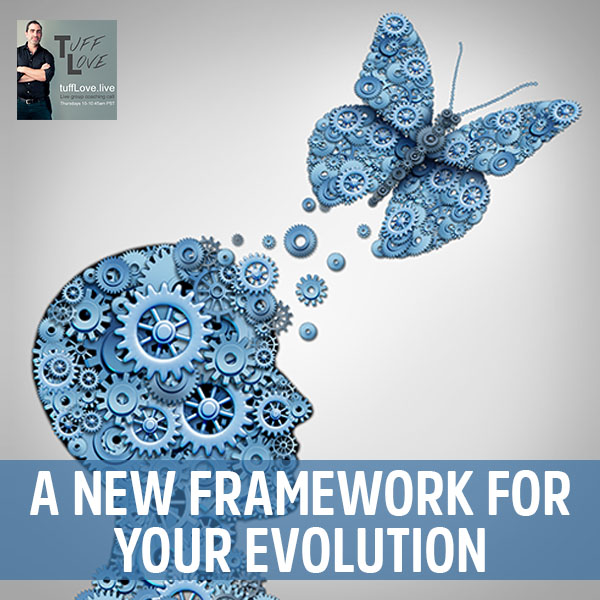
140: Six Conversations 3.6 – What We Want You To Know
Jun 8, 2018
In the final show of Season Three of Six Vulnerable Conversations between a gay and a straight man entitled What We Want You to Know, we will be discussing our messages to each other and the world on how we can better relate to each other. We’ll be taking off the gloves and speaking the raw truth, the Tuff Love, and more so we can live together in this chaotic world. It’s the last bit of pieces and ideas and concepts to communicate about our ideas about laws and workforces to the youth of America and other countries, and those final little pieces of advice that we each want the other person and you, our audience, to know.
—
This is show number six of the third season of Six Vulnerable Conversations. This one is between Jeff Jacobson, a gay man, and Rob Kandell, a straight man, just talking about issues and ideas and concepts. This is our final show titled, What We Want You to Know, like the last bits of pieces and ideas and concepts to communicate about our ideas, laws, and workforces to the youth of America and other countries, and those final little pieces of advice that we each want the other person and you, our audience, to know. For more shows, please visit RobertKandell.com/episodes.
140: Six Conversations 3.6 – What We Want You To Know
This is show number six, Season Three of Six Vulnerable Conversations between a gay man and a straight man, Jeff Jacobson and Rob Kendall. Hi, Jeff.
It’s our last one.
This final show is called Things We Want the Other to Know. What do you think a straight man should know about how to be friends with a gay man?
You don’t have to be afraid. There’s a little bit of, “We’re all just trying to get in your pants” thing. Even if we were, it’s not like you’re going to get raped. I said that lightly, that you don’t have to be afraid of us trying to get into your pants, but also any of the fears that you had about people like us growing up and being told things that you don’t want to be like that, if you can put that into check and just dive in and get some good gay friends, I think it will be lovely. I’ll like it. I’d say check your fears at the door and pick some folks that you’d like to get to know better. What about you? What in terms of gay men making friends with straight men?
Probably to be aware of everything you said is going on in our head, unless we’ve had experience with gay friends in the past, your first gay friend, just know that there’s probably a lot of questions and unknowns and biases. The same could probably for personal color or someone from a different country. We were told bad stories about gay people and so just know that hesitation is not personal to you. It’s not personal, it’s what we were trained. Have patience until we catch up with reality that you’re just another person and be willing to help us see that with their patients rather than your brute force.
I can forget sometimes because I’d been out of that because coming out and healing and doing all that work, it seems like we’re all used to it now. People know gay men, but they may not be friends with them, yet that stuff all gets thrown in your face.
The younger generations are much better at this than the older generations. I’m hoping, at least that’s my impression though. I don’t have access to deep South states and more Republican-based concepts, but at the same time, I’m just hoping that this next generation can have more permission and freedom for all genders and all sexual relations or sexual orientations to be friends based on the merit of the person rather than not being friends just because they’re different.
What we’re doing here and what we want people to be able to do, it’s more like the gap work where younger folks won’t have to. It may seem silly, like, “Why would you worry about not having a conversation between gay men and straight men?” At this point, it takes a little bit more intentionality.

What We Want You To Know: Think about it, be aware of it. Are there other conversations you’d be willing to have with people who have very strong homophobic fears?
What do you want to tell us about how we can be of service to your gender, how we can help you?
Stand up to gay bashing vocally and proactively. Let me say queer bashing. I noticed any time somebody, anybody within my community that’s not necessarily a gay man gets attacked, I feel it too. Think of something that you care about. Think about the #MeToo Movement and sexism, let’s say you’re single and you know you went out to stop sexism, but then you start dating a woman and you see how it impacts her specifically and start to take more of an investment in reducing sexism, it’s the same thing. It’s satisfying when I know that straight people are out there wanting to put this stuff away and not just us and the queer community.
It wasn’t so much I was catcalling women or being abusive, but I definitely allowed others, which is a crime in itself. I hear what you’re saying is to step up, to stop when I hear it or vocally say, “That’s not cool when you gay-bash or gay-ridicule. Be willing to be the stand for better behavior among all genders and all orientations.
Unless that comes across me saying, “Carry a sword and shout out and bonk people over the head and yell all the time.” Let’s say you hear someone bashing somebody queer, would you be willing to be intimate with them and get curious about their point of view and share yours and create a relationship with them? That’s heavier lifting than bunking them over the head literally and metaphorically. A friend of mine told me this story. One time she dates this woman and my friend’s partner can be pretty gender fluid at times. He identifies the woman as a cis woman, but at time is dressed up to look more masculine. They were on a road trip and they went into the bathroom and my friend’s partner went into the women’s bathroom. They had segregated bathrooms. Somebody in there told her to get out, that she should be in the men’s bathroom. My friend got mad and went off on the woman. They got back in the car.
They’re both a little shaky and my friend turns to her partner and says, “Are you okay? How are you doing?” She’s upset at my friend. She was like, “I don’t know if that did any good.” I’m embarrassed to say I don’t remember what the friend said. I remembered the takeaway from that conversation, which is my friend, let’s call her Sue. My friend Sue, in that moment, there was a part of her that wanted to be identified as one of the good guys and her yelling at this homophobic woman was a way to say, “I’m not that.” It wasn’t necessarily to support her partner. I fall into that camp around racism. Sometimes I wanted to yell at racists and it’s like, “Am I doing that because I really want to be an ally for people of color or am I trying to show that I’m better?” I don’t know how to translate that over into what you and I are talking about but be aware about it. Think about it, be aware of it. Are there other conversations you’d be willing to have with people who have very strong homophobic fears?
If you have communications for homophobic parents or homophobic relative, just start those conversations. Be willing to be like, “I’m not going to sit in this conversation if you’re going to be sexist or racist. I’m not going to be part of it. I’m going to leave. Is that what you want?” Everyone has a choice, but that’s so tough especially with peer pressure, especially when you’re younger trying to fit in, but it’s the only way, and end it in the drip, not in the brute force method.
It can be the drip method that has consistency over time. When somebody can see that model, they can go do it. Most of the time that we see the model, did you keep your mouth closed or you attack somebody? How do you do it in a humane way? I think that’s harder. Another thing I was thinking about that I’d like you to know and maybe a way to be an ally is to increase your intimacy with other men. With gay men, but with straight men too. I’m not talking about having sex, but if you want that great, but heart intimacy, because there’s such a fear about men on men closeness. If you’re willing to bust that up, you’ll benefit from it because you’ll will expand your caring circle and you’ll knock some walls down. You’ll also show the rest of the world that says nothing wrong with it. Men on men closeness ends up becoming relegated to my world rather than just men. That’s a loss for everybody. In boys, they look at it and see, “I have to grow up and be an automaton or a faggot.” Neither are really great choices. What about you? How can gay men support straight men?
I don’t think in terms of legality, we don’t have any problems there since we own the loss, but I do like the concept of gay men demonstrating what it would be friends with another man. It’s funny because men know how to interact with other men for production, for moving things from point A to point B, from sports teams, from building shit, and it’s harder just to be an acquaintance. I’m lucky to have three or four guys that I consider intimate friends that I can call and talk about my emotions, but that’s because I was in pretty deep situations with them. Continue to demonstrate and offer the model of how to be friends.
You have these buddies and you do reach out to them?
I do. Ken Blackman is someone who remains a friend after all these years. When I got problems, he’s the first person I call. It’s my therapist. It’s my Shaman. It’s Ken. Those are the people who are out there that I know who has my back and there are other men out there. There’s probably a good dozen guys I could think of but I feel lucky to have guys out there. “Morgan did this. She’s driving me crazy.” He’s like, “This happened before.” He knows my history. To have that friendship is so important. What do you want us to know about the work world? In other words, being a gay man in the work world. What do you want us to know?
A lot of gay men, maybe there’s room for corporate people in general. A lot of us felt very inadequate growing up until we over compensated. I know that everybody can struggle with this, regardless of what your gender or sexuality identity is, but feeling very inadequate and then overcompensating and it never feeling like it’s quite enough. I know I can feel some resentment at times where I might see some straight guy who’s just coming across as a bit of a slacker and he gets kudos. Then it’s like, “Am I trying to overcompensate for anything?” Be aware that your queer colleagues might have some habits of over-producing and overachieving just so they can balance that out with feeling lacking on the inside and be on par. I’m not saying that this is a regular driver for me all the time, but it still kicks in.
I never would have thought about that.
You mean in terms of the overcompensating? Think about neat, organized, on-time gay men. There’s a stereotype of, “They’re always fun and always orderly and always neat.” Sometimes it’s because they’re trying to come across as looking good because they’re so worried about people’s homophobia. It would be nice if they could be a little bit slobbier than me now and then. I see this in a lot of workplace. I see a lot of queer men on the outside of straight men cliques socially at work. If a gay man gets included, he’s a bit of the special one or the mascot. Just reach out and try to include more.
A lot of times, people ask me what it was like in China and being out in China. I’m going to make some very gross generalization, but in China one of the things I noticed is there’s a fair amount of protection at work if you come out, so people tend to be out at work and not out socially or with their family. Here, I notice it’s a bit of a reverse. I know lots of folks who were out with their family and friends and loved ones but keep under the radar at work because of the overt or the implicit discrimination. Let’s say you know somebody who’s gay and he think that he’s hiding at work, don’t ridicule him for it and maybe talk to him about it.
How would you suggest starting that conversation? You have a work colleague who everyone knows is gay and you feel him isolating. Do you have initial words that you perceive would be well received by this conversation?
Let’s say it’s you and me. If I’m hidden at work, I could feel your approaching that topic as threatening. Other than that, if you’re willing to be vulnerable, look a little stupid, be embarrassed, say you’re worried about making some mistakes or coming across as too strong, if you set the stage that way, then I can listen. Some version of, “Jeff, I wanted to bring something up with you. I’m a little nervous on how to do it. I know I make you uncomfortable, but it’s not sitting right with me,” something like that. That makes it easier for me to listen.
A slow, engaging, take care communication bridge.
Yes, and I would build the friendship bridge too, because it can open a can of worms. It’s not as fun as if somebody who pokes out at all that stuff spelled out and then they take off. I’m often reminded, especially gay white men, that they still have a lot of status at work, so don’t walk around like they’re the only ones being oppressed. Not to mention women and people of color are also getting it or getting it worse or getting it in different ways. Sometimes being raised male, we’re still used to thinking ourselves as the most important and then if you throw in oppression, it’s like, “We have the most important kind of oppression.” It’s like, “No, you don’t.”
Just seeing reality, not forgetting that there are others in worse shape than you.
I know my male privilege helps me forget that, as well as my white privilege. What about you in a working environment where there are gay men? I’m thinking back to how you talked about how they would flirt with you so much where you worked before at that restaurant.
There are subtle forms of harassment that maybe straight guys won’t communicate because they want to look tough, especially gay men, you’ll get under their skin. We want to look tough. We want to be able to handle everything. While I was lucky to have enough self-awareness and self-empowerment to not fall prey to it, it did affect me, and I do have memories of it. I do remember feeling uncomfortable. Just to know perhaps that if you’re in this banter place and you’re flirting with a guy to get a reaction, he might not show you the reaction. He might internalize his reaction, which can cause damage in that moment or somewhere down the line, so just be careful and to maybe even ask permission in some way before you do what you do.
I have not thought about that. That’s good to hear. Let’s say I’m being my gay self and somebody gets too uncomfortable, how would I approach it with them?
The first thing is to keep paying attention. I know guys are hard to read sometimes because we are experts at these stoic faces. We’re expert at not showing too much because it means we’re weak. Maybe you have a sense that something is amiss, just maybe mention it. If there’s something happening that feels uncomfortable to speak up, I don’t want to put that responsibility. On the same level, you can be responsible for your communication. You can be responsible for the things you say and the way you act.
If I sense something is off, I’ll just speak out about it?
Just say it like, “Is this okay?” It could be as simple as that. It’s like, “I flirt with you because I like you. I know you’re straight and I know you’re not expecting anything. It’s just my way of banter and teasing. Does that feel okay?” Then give the guy the opportunity to say yes, no, or maybe.
To me, that’s much more subtle and sophisticated level of communicating. Rather than, “I’m gay, I’m out, I’m proud, I should be able to do whatever I want, and let the chips fall where they may.” I have a straight friend that worked in a bar at a bowling alley. They had family night either once or twice a week and that meant LGBTQ night. He noticed if he smiled a little bit more, if you let us gaze linger a little bit longer when the guys came up to order pitchers of beer, he got more tips. He noticed if he wore the tighter pants rather than the ones that weren’t so tight, he told me that he felt awful, he felt guilty. He was like, “Do you think that this is bad? I don’t want to give them the wrong impression.” I was like, “They know.” Some people see that as a challenge, but that’s not what everybody’s going to do, and the flirtation can be fun. I was also thinking like, “What’s wrong with that?” I appreciated that he didn’t want to come across as bad or something. It was fun for guys as long as they’re willing to flirt back and not have it be against their nature or that have to mean anything.
Which is the hardest part, flirting for flirting’s sake.
Maybe straight guys need to flirt more with gay guys.
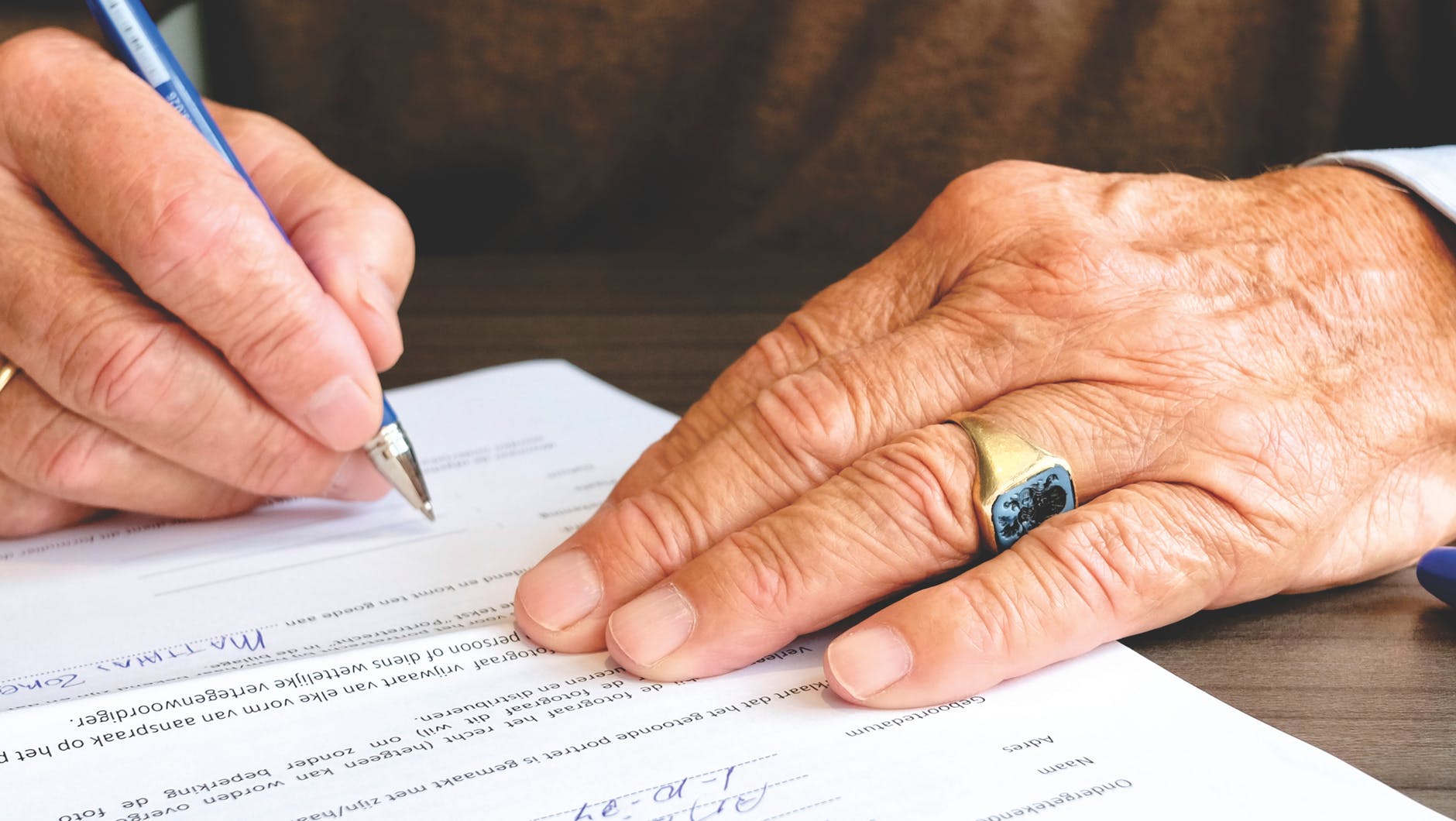
What We Want You To Know: Maybe we need to beef up the laws but we need enforcement better.
Let’s make that a universal rule. Straight guys need to flirt more with gay guys. I was a bartender at the same restaurant that I was tortured at. I used everything I had to make more money. I flirted with everyone and everyone was fun to flirt with.
You noticed it helped with the tips?
Huge, but there was a bar between me and the person. There was a physical barrier and I was very aware of that. Married women tip the best. The lonely, dorky guys tip the best. There was one set of dorky guys who would tip as well when we took care of them like kings, but married women were a close second. Restaurant people always tip the best. Take out the restaurant demographics, maybe it was the dorky and lonely guys because we knew they tipped well, so we put them at the top of every drink order and then married women. They love to be flirted with, so check the ring, check the hand, flirt, and that’s where the money is. If you could pass a law or two that would support the gay culture, do you have any ideas of what that law would be?
Follow-up in temper standards when there’s gay bashing, especially right now with trans bashing. I can barely comprehend the amount of violence that goes on against trans men and trans women. I know it’s high, but I don’t even know how high it is. There are laws that would be passed but it’s not just violence, it’s hate crime. We’ve got the laws in place. Maybe we need to beef up the laws, but I think we need enforcement better.
Discrimination laws besides the bashing would help LGBT. I feel like it’s gotten stronger, but I still think people will not hire or not allow you in the restaurant based on your sexual orientation. I do like the law of if you gay-bash, the punishments are harsher.
It’s considered a hate crime, not just a crime against another human.
I love the response that Starbucks had to the two black men being arrested in Philadelphia. They closed it and it was $10 million to $12 million in loss in revenue and income. The guy who runs Starbucks just made that important. I don’t know how people took it. The media has been pretty positive around it, but I thought it was an amazing thing what this guy did. It was to say, “This is not just a stand for Starbucks. This is a stand for everyone to wake up.” Apparently, the documentary they did and all the work that is available for other corporate training, so I thought it was a pretty amazing thing they did that.
That’s putting your money where your mouth is. We laugh these days that we’re hearing from Congress, “Thoughts and prayers” and in a way sometimes people say, “That’s bad.” It’s the thoughts and prayers, but Starbucks is willing to lose a chunk of change.
I thought it was amazing. I thought it’s the way it should be. The stuff they do is now part of their onboarding process, so they learned. I would love to give more attention on people being educated. I think so much of this is just miseducation. I know my relationship to gay people were tainted by poor information in the ‘70s and ‘80s, and I took until I started meeting gay people and I was like, “You’re not at all what I thought. You’re not the stereotype that I learned.” I re-educate myself and it took a while. It wasn’t instantaneous, it was time and time again, direction after direction to really be, “These are normal people. They just like guys instead of girls.”
There’s a really a funny movie that Seth Rogen plays. He and Mary are roommates and he’s in a bar at a high school reunion. She’s off flirting with this guy that she always wanted to have sex with and thought was cute. Seth starts talking to this guy and it becomes pretty clear that he’s gay even though he’s in the adult film industry and he’s this guy’s boyfriend. Seth is like, “My roommate’s over there trying to flirt with a guy who’s gay.” He plays that clueless straight guy role. The other guy comes over and the two of them start fighting to get in an argument and Seth Rogan’s character, Zach, is like, “This is real people.”
You could tell he hadn’t ever seen the stuff that they were fighting about. I don’t know about laws, but here’s something that’s gotten fuzzy in public opinion. I as a business owner can refuse service to an LGBTQ person based on my religious beliefs. That fucked up in a lot of ways. One, it’s fucked up in that there’s a complete non-separation of church and state. It is so completely against what this country says it’s supposed to be about. In theory, I want business owners to be able to serve who they want to.
The other place where it’s fucked up is many times, those same people say that we’re making a choice by being gay, like it’s a philosophy. It’s like, “If you say ours is a philosophy, how about any LGBTQ person in a job gets to refuse service to a Christian person because it goes against our philosophy?” My sense is that wouldn’t get very far because people would be furious, but it’s the same thing. If anybody out there was a little unclear on this issue, let me make it clear for you. It’s bullshit that I don’t have to give service to somebody who’s a different philosophy than me. That is illegal. It is unconstitutional and it’s also wrong. If you’re not sure in that issue, just take my word for it or talk to somebody else’s work and get clear on it and then stand up again. It’s complete bullshit.
I was thinking about when gay marriage first started, there was a clerk in Texas who refused to give marriages and she got arrested.
Like the cake decorators. If you’re going to refuse service, lie about it and don’t say it’s about that one thing because if you say it’s about the other person being LGBTQ, that needs to be prosecuted. That woman was arrested but there’s so much of the stuff that goes down that didn’t caught.
What do you want to tell the youth of America? What do you think they should know from a gay man growing up in today’s world? What do you think they should know?
We need you, young folks. There’s this flexibility and open mindedness and unwillingness to make this shit issued. We need that mindset for people like me and my age and people like you, Rob, and your age. It’s always been a hot button to not even think about it as that big of an issue. That’s a mindset and support that this generation are working towards but don’t really have. We need their leadership. I’m talking directly you, young people. We need your leadership around this. I don’t think it’s all handled, and you guys are perfect for use with this issue, but you have way more slack than people older than you do. The other thing to keep in mind though is be sensitive around your older queer and straight family members and friends who didn’t grow up with these kinds of views and know that it was absolutely issues of life and death. Don’t bonk us over their head when we go with being a little sensitive but also don’t tolerate our fears and our inner critics as the truth either. What about you? What do you want the youths to know?
Be curious. Be willing to ask questions, don’t buy the stereotypes, break through the stereotypes. It’s really important for you to find your own way of interacting. The future really is in your hands. Millennials are now the largest age group in America than any other demographic and so it’s your time. It’s your time to truly change, and I think change is needed. I think a lot has happened the last 40 years and I think it’s been incredible. Gay marriage is amazing. Civil Rights is amazing. There’s been incredible changes, but we still live in a society of difference, challenge, anger, isolation, and separation. Whatever you can do to cross the lines to create more union and more connection because we’re spending so much time hating out of ignorance rather than spending time learning. At least there was acceptance if not love.
Completely be overjoyed with acceptance, not worried about going into the love level.
You never have to worry about a bottle being thrown at you at the Castro. “I never have to worry,” is the thought or acceptable or can I say, “Can I call the show between a gay man and a straight man?”
Are you going to get in trouble as a straight man? You and I should go somewhere public and hold hands and walk around.
Are you flirting with me?
It’s a twofer. One is I’m flirting with you because I wanted to hold your hand for a long time and you never let me. Two, I think it could be interesting to see what arises for us.
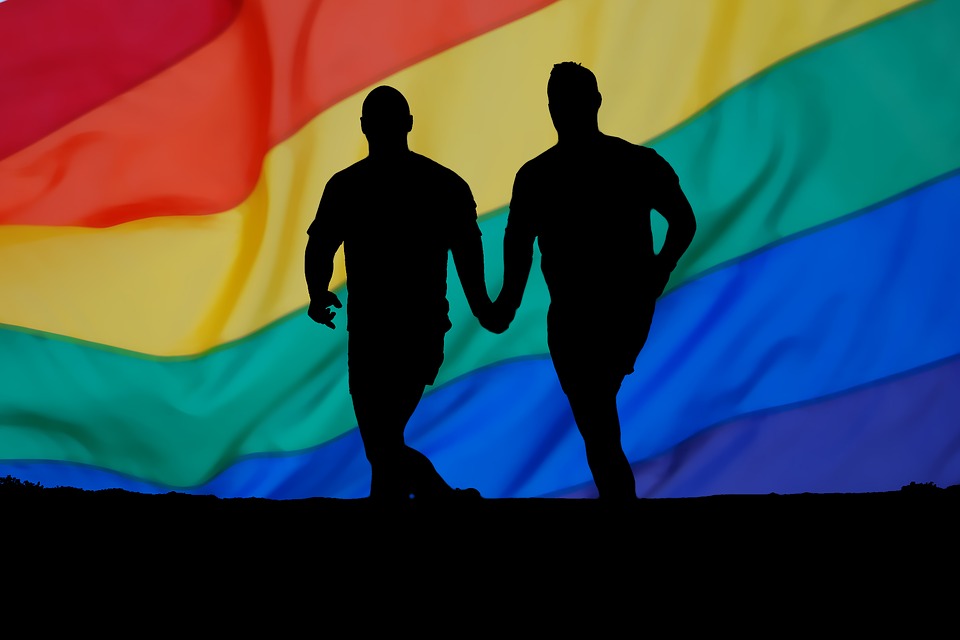
What We Want You To Know: Two men holding hands in this culture is a different thing.
I’ll have to ask Morgan but I’m sure she’ll watch and enjoy.
It would be fun to have her there and then we can go and talk to her about like, “Here’s what’s arising,” because two men holding hands in this culture is a different thing.
I do these journeys. Sometimes you get very physically close to another person and sometimes get very physically close to another man or hold another man. When their defense drops, he just stops being a man. He just starts being a person.
It’s lovely, right?
Yeah, it’s just is. You don’t have to think about it. It just is. Any last thoughts for our audience?
For those of you out there that if you listen to one or any of these podcasts, if there’s one you’re on or it sparked your imagination or that pissed you off or wasn’t clear to you, speak up. Rob and I are not trying to be like the know-all-be-all for this topic. If other people want to join in, that would be fabulous.
It’s obvious that we don’t know all and we’re just learning and that’s okay. It’s okay to be in the inquiry of what it means and how to interact with different orientations and different genders. It’s not taught to us. It’s important to maintain your clarity.
It’s important that somebody like you said, “I hope this is as needed and I’m willing to create some podcasts around it.” You didn’t even hide with the title. It’s right up front.
That’s what Tuff Love is about. Tuff Love is about taking the truth that’s hard to say or hard to hear. It might burn leaving your throat or burn when it comes into your system, but at the end, you feel better. That’s what Tuff Love is. It’s tough. We have a lot of love and that’s the intention of the podcast. Thank you so much for participating. I’m grateful.
Thank you for having me.
Give the folks how they can find you.
JeffJacobsonWorld.com, Jeff@JeffJacobsonWorld.com is the email.
If you want more shows, check out RobertKandell.com and subscribe on iTunes or on Stitcher or your favorite podcast app. If you feel so inclined and you’re loving it, give us a review and say, “Jeff and Rob changed my life.” We’d love it. Thank you so much.
It’s been an amazing series and I’m just so grateful that you took the time and energy to educate me and the audience of the Six Vulnerable Conversations between a gay man and a straight man in today’s world. If you like the show, please visit iTunes, Stitcher, or your favorite podcast app and leave us a review. Please subscribe. It makes a big difference when you subscribe and get all the shows and helps me with my downloads. It makes me feel good. Finally, go forth and hopefully use these ideas and concepts to be more connected to a person and another gender or another sexual orientation from yourself. Take those steps to say, “I want to get to know you for who you are rather than what I think is in my head,” because that, my friends, is how we change the world. Thank you so much. Go forth. Be free. I love you. Thank you so much. Take care.
Resources mentioned:
- Jeff Jacobson
- #MeToo Movement
- JeffJacobsonWorld.com
- Jeff@JeffJacobsonWorld.com
- Tuff Love on iTunes
- Tuff Love on Stitcher
About Jeff Jacobson
 Jeff Jacobson was born in Seattle in 1968, and grew up enchanted by the lush landscape, the long summer days, and the short winter nights of the Pacific Northwest.
Jeff Jacobson was born in Seattle in 1968, and grew up enchanted by the lush landscape, the long summer days, and the short winter nights of the Pacific Northwest.
Once, when he was a wee kindergartner, his grandmother let slip that she was a “modern witch, who flew on a vacuum cleaner over his house at night to protect him.”
Jeff had seen her vacuum cleaner. The cord wasn’t long enough to reach his house.
But in bed that night, left alone with creaky sounds and branches scraping over window frames, he decided that having a witch for a grandmother wasn’t such a bad thing. Even if it weren’t true.
Two years later, his second-grade teacher Mrs. Eliason read spooky ghost stories and hung cardboard decorations of bats, witches, vampires, and spiders from the ceiling of his classroom for the two months leading up to Halloween. With Seattle’s gloomy, wet afternoons as the setting, the spirit of Halloween took root in his heart, just a few inches over from where his grandmother’s witchy identity resided.
jeff-jacobson-flying-on-a-broomstickFrom then on, he did his best to navigate the mundane world of school, chores, and everyday life, while his imagination often ran wild, and he read as many books on witches and All Hallows’ Eve as could get his hands on.
In the third grade he spoke Pig Latin and other made-up languages with his friends, creating an early love of sound, linguistic study, and fascination with foreign cultures.
Sports played a big role in his life. He swam on swim teams, ran track, played soccer and tennis, and was a springboard diver for six years. This, combined with the fact that he didn’t play dress-up as a kid, or stage musicals, gave him the false impression that he was just like every other boy around him (foreshadowing alert!).
In college he took Asian Studies classes and dove into learning Mandarin Chinese with gusto, spent his senior year studying in 10 different countries in Asia. He went on to live in Taiwan for two years after graduating from college to pursue advanced Mandarin studies.
In 1994, Jeff moved to California to begin a master’s program in Chinese translation and interpretation, and also joined a men’s group. Three months later he realized two things: that he was much more interested in community-based coaching than he was in being an interpreter, and that it was finally time to come out of the closet.
Soon afterward he learned about the wider field of coaching as a profession, and became a certified coach, as well as a faculty member for the Coaches Training
Podcast: Play in new window | Download





